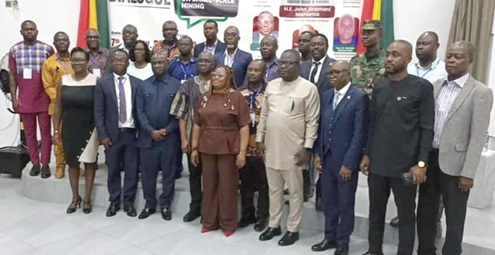The Minister of Environment, Science, Technology and Innovation, Dr Murtala Mohammed Ibrahim, has expressed the government’s commitment to fund the remediation of polluted rivers and reclaim contaminated farmlands.
He said the government was also willing to support relevant state institutions to eliminate illegal mining in the country.
Dr Ibrahim said this in a speech read on his behalf at the 4th Annual Transformational Dialogue on small-scale mining organised by the University of Energy and Natural Resources (UENR), at Fiapre, near Sunyani in the Bono Region yesterday.
It was on the theme: “Eliminating illegal mining in Ghana — The will and the bill.”
Participants discussed and shared knowledge on ways to eliminate illegal mining and how to harness the full potential of small-scale mining for development and economic growth.
They included representatives of the Ghana National Association of Small-Scale Miners, Association of Women in Mining in Africa and Ghana, the Regional House of Chiefs, large-scale mining companies, students and civil society organisations, among others.
Illegal mining
Dr Ibrahim said the issue of galamsey remained one of the most pressing environmental and socio-economic challenges confronting the country.
"Yet, we also stand at the threshold of a new opportunity; one that allows us to rethink, reimagine, and reform how we mine and manage our natural capital," he said.
He said in tackling the complexities of galamsey, the government recognises that enforcement alone could not be the answer, "we need innovation, education, and meaningful community engagement".
"This is where higher educational institutions must serve not only as centres of academic excellence, but also as drivers of sustainable development," the minister said.
Dr Ibrahim said the ministry was committed to strengthening partnerships with institutions to seek science-driven and community-centred solutions to the crisis of environmental degradation.
He, however, charged tertiary institutions to lead in applied research in sustainable mining technology and land restoration, while training the next generation of environmental scientists, geologists, and policy advisors.
The minister said the cost of environmental degradation due to galamsey was 2.8 per cent of the national Gross Domestic Product (GDP) in 2017, rising to about 18 per cent by December 2024.
Dangers
The Bono Regional Minister, Joseph Addae Akwaboa, said galamsey continued to threaten national development, destroying farmlands, polluting river bodies, forest reserves and the entire eco-system of the country.
He said the menace, if not stopped, could displace communities and undermine legal mining operations.
"Therefore, the fight against galamsey is not about law enforcement, it is also not about governance, education, and community empowerment, but a moral and sacred duty we bear for future generations," Mr Akwaboa said.
He urged the participants to use the platform to forge real partnerships, share best practices, and provide recommendations that would shape the future of small-scale mining in the country.
Writer's email: biiya.ali@graphic.com.gh

